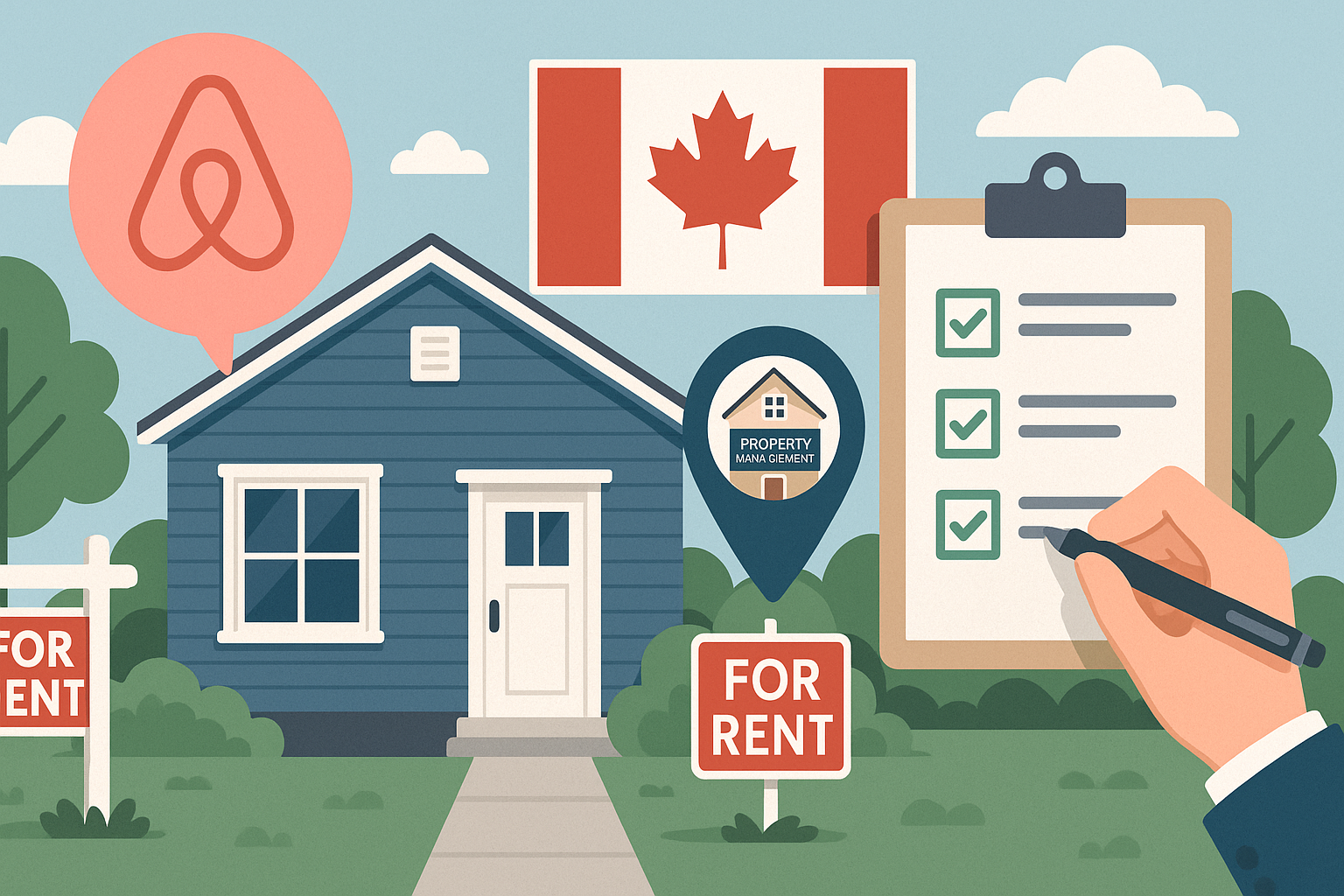
Short-Term Rentals in ADUs: Navigating Airbnb, ADU Regulations, Canadian Laws, and Property Management for Success
Estimated reading time: 8 minutes
Key Takeaways
- Extra Income Potential: Renting out ADUs can boost your monthly income significantly.
- Regulatory Compliance: Understanding and following ADU regulations and Canadian laws is essential.
- Airbnb Exposure: Platforms like Airbnb bring global visibility and streamlined bookings.
- Enhanced Property Value: A well-managed ADU can increase your property’s market worth.
- Effective Management: Strategic property management and clear communication are key for success.
Table of Contents
Understanding Short-Term Rentals in ADUs
Short-term rentals in ADUs have become a transformative trend for Canadian homeowners. By converting basement suites, laneway houses, or garden suites into self-contained rental units, property owners can earn extra income—often using popular platforms like Airbnb.
ADUs, or Accessory Dwelling Units, are legal, secondary housing units separate from the main residence. These units are fully equipped with kitchens and bathrooms and are frequently used for short-term rentals across Canada. For an in-depth definition of ADUs, see this resource.
With rising demand for unique and flexible lodging, homeowners are increasingly focusing on maximizing their properties. However, this opportunity comes with regulatory hurdles—navigating Canadian laws and specific ADU regulations is critical. For more on the permits and zoning laws in Canadian cities, visit this guide.
What is an ADU? (Keyword: short-term rentals)
Accessory Dwelling Units are independent secondary units located on the same property as a primary home. Common types in Canada include:
- Basement suites: Fully developed, legal secondary suites in the basement.
- Laneway houses: Standalone units built in the backyard, accessible from an alley or lane.
- Garden suites: Detached units built in the yard for extended family or rental income.
- Coach houses: Smaller homes located over garages or in rear lots.
- Secondary suites: Self-contained spaces separate from the main home.
Each ADU offers its own kitchen, bathroom, living area, and separate entrance—qualities that make them especially attractive for short-term rentals. For a broader look at ADU benefits, check out this comprehensive guide.
Why Are ADUs Uniquely Suited for Short-Term Rentals?
- Complete Privacy: Enjoy maximum privacy for both guests and homeowners.
- Independent Amenities: Benefit from dedicated entrances, kitchens, and living spaces.
- Flexible Usage: Easily switch between personal use and rentals.
- Appeal to Travellers: Provide a “home away from home” experience attracting diverse guests.
Benefits for Canadian Homeowners with ADU Short-Term Rentals
- Higher Per-Night Revenue: Renting an entire ADU can command a premium.
- Boosted Property Value: ADUs can enhance your home’s resale value—see Ontario data here.
- Greater Flexibility: Manage personal usage and rental availability seamlessly.
- Tax Deductions: Eligible expenses for short-term rentals may be deductible.
- Neighbourhood Compatibility: Increase property density with minimal community disruption.
- Long-term Investment: ADUs offer potential for future long-term rentals or family housing.
For more insights on property enhancement through ADUs, visit this resource.
Regulatory Considerations: ADU Regulations and Canadian Laws
Navigating the legal framework for short-term rentals in Canada requires attention to multiple layers of regulations. Whether you are listing on Airbnb or another platform, compliance with zoning requirements, municipal bylaws, and safety standards is critical.
Navigating Canadian Laws for Short-Term Rentals in ADUs (Keyword: ADU regulations)
Compliance involves several key factors:
- Zoning Requirements: Ensure your ADU is located in an approved zone.
- Municipal Bylaws: Follow local rules regarding licensing, guest limits, and principal residence restrictions.
- Safety Standards: Verify that your ADU meets all building codes and fire safety guidelines.
- Licensing & Registration: Obtain the necessary permits before listing your ADU.
- Tax Compliance: Be aware of applicable federal GST/HST or local occupancy taxes.
For a detailed overview of Airbnb regulations in Canada, refer to this page.
For more comprehensive insights on provincial ADU regulations and building permits, see this comprehensive guide.
How Regulations Vary Across Provinces
Here are some highlights:
- British Columbia: As of May 1, 2024, only your principal residence and one secondary suite (including ADUs) can be rented short-term in communities with over 10,000 residents. Registration and proof of primary residency are required. Additional municipal rules may apply. For more details, see the provincial summary.
- Quebec: All properties—including ADUs—rented for less than 31 days require a provincial registration or CITQ number and must adhere to strict signage and guest notification standards. More information is available here.
- Ontario: Streamlined regulations support more ADUs such as garden suites and basement apartments. In cities like Toronto, short-term ADU rentals are limited to 180 nights per year and require proof of primary residency. Further details can be found here.
- Alberta: Regulations vary by municipality with some requiring business licenses or registration. Cities like Edmonton and Calgary have distinct standards for ADU rentals.
Common Legal and Compliance Challenges
- Licensing and Registration: Missing or incorrect permits can result in fines or removal from platforms.
- Principal Residence Validation: Many regions require proof that the ADU is part of your primary residence.
- Zoning Compliance: Renting in non-allowed zones could lead to enforcement actions.
- Safety Documentation: Maintain up-to-date inspection reports and compliance paperwork.
- Tax Issues: While platforms like Airbnb may collect some taxes, owners remain responsible for federal/provincial tax obligations.
Regularly review local municipal and provincial websites to stay updated with evolving regulations. For a more detailed update, visit this guide.
Listing Your ADU on Airbnb: Opportunities and Challenges (Keyword: Airbnb)
Airbnb is the platform of choice for many Canadian homeowners venturing into short-term rentals in ADUs. Here’s a closer look at the benefits and challenges:
Why Airbnb Is Popular for ADU Short-Term Rentals
- Global Exposure: Airbnb brings your ADU to a worldwide audience.
- Secured Payment Processing: Transactions are managed securely through Airbnb’s system.
- Trust-Building Reviews: Guest and host reviews foster transparency and reliability.
- Flexible Booking Options: Control your calendar, pricing, and booking rules.
- Built-In Marketing Tools: Benefit from automated messaging and professional photo suggestions.
Canadian Opportunities on Airbnb
- International Clientele: Attract both local guests and international tourists.
- Income Potential: Increase revenue during festivals, events, and peak seasons.
- Streamlined Bookings: Enjoy hassle-free management of inquiries, cancellations, and payments.
- Dynamic Pricing: Adjust rates based on market demand and competition.
Key Challenges for Canadian ADU Hosts on Airbnb
- Regulatory Complexity: Non-compliance with local laws may lead to listing removal.
- Insurance Gaps: Check if your current policy covers short-term rental activities or if additional insurance is needed.
- Neighbour Concerns: Manage noise, parking, and traffic to avoid complaints.
- Taxation: Remember that income from Airbnb is taxable and may involve occupancy and sales taxes.
- Seasonal Variations: Booking demand may fluctuate with seasonal trends.
For more on the challenges and nuances of short-term rentals in Canada, visit this insightful resource.
Effective Property Management for ADU Short-Term Rentals (Keyword: property management)
Running a profitable ADU short-term rental involves more than just legal compliance—it requires strategic property management. Here are proven practices to optimize your rental:
Proven Property Management Practices
- Clear Guest Communication: Use automated check-in instructions and detailed guest guides.
- Quality Photos: Invest in professional images to showcase your ADU’s unique features.
- Enforce House Rules: Set clear policies on noise, extra guests, and parking to minimize conflicts.
- Local Amenities & Attractions: Provide tips on neighbourhood cafés, transit, and local attractions to enhance guest experiences.
- Maintenance Schedules: Regular inspections—especially before and after winter—help maintain property conditions.
For guidance on optimizing rental unit profitability, visit this resource.
Property Management Options
- Self-Management: Handle bookings, cleaning, guest queries, and maintenance yourself if you prefer complete control.
- Professional Services: Hire a dedicated agency to manage day-to-day operations, ideal for absentee owners.
- Property Management Software: Leverage tools for automated calendar syncing, messaging, and financial tracking.
Balancing Personal and Rental Use
- Calendar Blocking: Reserve dates for personal use while still optimizing rental opportunities.
- Seasonal Planning: Adjust your strategy during holidays and off-peak seasons to maximize occupancy.
Security and Risk Mitigation
- Well-Lit Entrances: Improve safety and guest confidence with adequate outdoor lighting.
- Keyless Entry: Utilize smart locks or keypad systems to streamline guest access and track usage.
- Routine Inspections: Conduct regular walk-throughs to promptly address any maintenance issues.
Climate Considerations for Canadian ADUs
- Winterization: Insulate plumbing and seal drafts to prepare for cold months.
- Summer Maintenance: Service air conditioning and inspect windows to keep your unit comfortable.
For Ontario-specific insights on ADU property management, refer to this detailed guide.
Conclusion
Short-term rentals in ADUs offer Canadian homeowners numerous benefits including increased income, enhanced property value, and flexible usage. However, successfully managing an ADU rental requires strict adherence to Canadian laws, ADU regulations, and municipal bylaws.
Thoughtful property management, from clear guest communications to regular maintenance, plays a critical role in ensuring a positive rental experience. Homeowners are encouraged to stay informed about evolving regulations and to consider both self-management and professional management solutions.
By making smart, informed decisions and leveraging available resources, you can unlock the full potential of your ADU rental while mitigating risks and maximizing returns.
Call to Action / Additional Resources
If you’re ready to embark on your ADU rental journey, here are the next steps:
- Contact Your Municipal Planning Department: Get the latest ADU regulations and short-term rental updates for your area.
- Consult Provincial Housing Authorities: Stay updated with evolving laws affecting ADUs and short-term rentals.
- Join Online Communities: Connect with other ADU and Airbnb hosts to share experiences and tips.
- Seek Expert Advice: Consider consulting a property lawyer or professional management company for tailored guidance.
For further reading, visit:
- Government of BC—ADU and Short-Term Rental Definitions
- ADU Rental Benefits in Ontario
- Airbnb Regulations Across Canada
- Quebec Registration Challenges
- Ontario Municipal Law Overview
Unlock the potential of short-term rentals in ADUs and make informed choices for your Canadian home today.
Frequently Asked Questions
- Q: What exactly qualifies as an ADU?
A: An ADU is a self-contained housing unit located on the same property as a primary residence, often repurposed from a basement, laneway house, or garden suite. - Q: Are there specific regulations for short-term ADU rentals in Canada?
A: Yes, regulations vary by province and municipality. It is crucial to consult local guidelines and obtain the necessary permits. - Q: Can I list my ADU on platforms other than Airbnb?
A: Absolutely. While Airbnb is popular, there are multiple platforms available. However, each may have specific requirements regarding compliance and insurance. - Q: What type of insurance do I need for short-term ADU rentals?
A: Standard homeowner policies may not cover short-term rentals. Check with your insurance provider about additional coverage or consider Airbnb’s Host Guarantee.

Leave a Reply